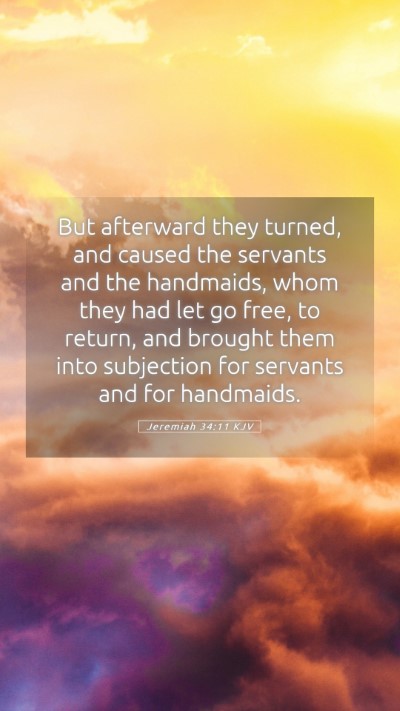Understanding Jeremiah 34:11
Bible Verse: Jeremiah 34:11 - "But afterward they turned, and caused the servants and the handmaids whom they had let go free to return, and brought them into subjection for servants and for handmaids."
Overview
This verse captures a critical moment in biblical history, shedding light on the actions of the people following God's decree regarding the release of Hebrew slaves. Here, we explore the Bible verse meanings related to Jeremiah 34:11 through various public domain commentaries.
Commentary Insights
-
Matthew Henry
Henry emphasizes the disobedience of the Israelites, who, despite entering a covenant to free their servants, quickly reverted to their old ways after the pressure of circumstances eased. This reflects a deeper commentary on human nature and society's tendency to revert to injustice even after affirming righteousness.
-
Albert Barnes
Barnes explains that this act of returning the freed servants signals a breach of trust and covenant with God. This implies a serious judgment on their moral foundation and relationship with divine instruction. There is a great weight in the accountability that comes with the freedom given under God's law.
-
Adam Clarke
Clarke provides a historical context for the verse and reflects on the cultural and societal implications of servitude in ancient Israel. He argues that the re-enslavement after a period of liberation highlights the lack of commitment to God’s commandments and serves as a cautionary reminder of the ease of returning to oppression.
Biblical Exegesis
In undertaking a Biblical exegesis of Jeremiah 34:11, we discern themes of freedom and bondage. The text serves not only as a historical account but also as a moral guideline for contemporary readers. It challenges believers to reflect critically on their commitments to justice and the sanctity of the agreements they make.
Application to Daily Life
The application of Bible verses often leads to deeper personal insights. Jeremiah 34:11 can lead readers to consider their own interactions and commitments. The importance of honoring one’s word, especially in contexts of service and relationships, is exemplified here, which can spark discussions in Bible study groups and online Bible study settings.
Related Cross References
- Exodus 21:2-6: Laws regarding slavery and liberation.
- Leviticus 25:39-43: Instructions about how to treat Hebrew servants.
- Deuteronomy 15:12-15: The release of slaves every seventh year.
Conclusion
In summary, Jeremiah 34:11 serves as a caution against the fragility of freedom and the responsibility that comes with it. The significance of this verse in both its historical context and practical implications cannot be overstated. It challenges believers not only to understand Scripture but to apply these ancient lessons in their daily lives.


